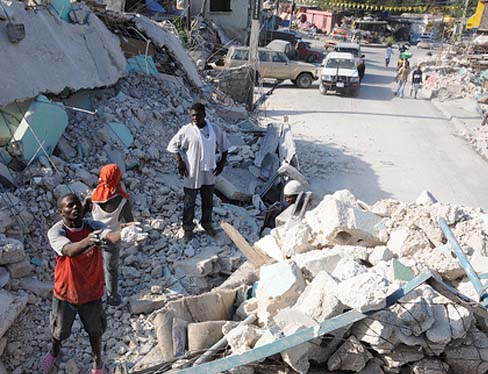Statement by the Canada Haiti Action Network, January 7, 2013
Billions of dollars of aid to Haiti have been pledged or spent following the devastating earthquake on January 12, 2010.* Yet three years later, life remains very harsh for many of the country’s ten million people. Haiti’s prospects for post-earthquake progress remain exceptionally challenging. The U.S., Canada and other wealthy countries need to end the destructive cycle of interference in Haiti’s sovereign affairs. They have a duty to provide meaningful assistance not only for obvious humanitarian reasons but also in recognition of the harm committed against the Haitian people over the decades by big power interference.
What has international aid achieved?
- Emergency relief in the days, weeks, and months after the earthquake saved lives, provided comfort to survivors, cleared rubble over time from streets and neighbourhoods, and provided rudimentary shelter for hundreds of thousands.
- Public infrastructure works have improved roads and bridges. Architects and builders, Haitian and international alike, have laid plans and begun the long process of rebuilding shattered homes and neighbourhoods.
- Medical assistance is one of the most important post-earthquake accomplishments. Thanks to the contributions of Latin American countries such as Cuba and Venezuela and global health agencies such as Partners In Health, and thanks to the Haitian people and government’s own efforts, improvements to health care services have been made.
- Successful projects in agriculture, education, and tourism have shown the potential for meaningful social and economic development in Haiti.
These and other success stories, however, are far outweighed by the disappointments and setbacks:
- Housing and shelter remains the single, largest failing of the post-earthquake period, as documented by the Under Tents housing rights campaign and in the recent report of a Canada Haiti Action Network delegation. Two recent reports by the Internal Displacement Monitoring Review and New York Times underline the ongoing urgency of the housing and shelter crisis and the failure of the large donor countries to assist in creating the vast program of housing construction that is needed.
- A cholera epidemic broke out in October 2010 as a result of negligence by the United Nations military presence (MINUSTAH). To date, the UN has refused to accept responsibility. One means to assure that vague promises by UN agencies to fully fund cholera treatment are realized is the legal action undertaken by the Institute for Justice and Democracy in Haiti and Bureau des avocats internationaux on behalf of cholera victims and the country.
- Democratic governance and accountability has not improved in Haiti since the rushed 2010–11 presidential election. Decades of political interference in the country by large foreign powers, including overthrows of elected governments in 1991 and 2004 have damaged national sovereignty.
- Economic development has been promoted by the Haitian government through an “open for business” philosophy that harkens back to the Duvalier tyranny of the 1970s and 1980s when starvation wages, low or non-existent taxation, and lax regulations were used to lure foreign factory investors.
- Respect for human and civil rights, as seen in the performance of police, judicial and penal institutions, has been halting or non-existent. The recent decision by the Martelly/Lamothe government to grant a diplomatic passport to Jean-Claude Duvalier is a scandal, as is its refusal to support the laying of criminal charges for past crimes.
There are reasons to be optimistic in looking forward in 2013. The Haitian people are rising from the post-earthquake devastation to assert their political rights and national sovereignty. Community and social organizations are forging new paths of development. Substantial and meaningful assistance continues to flow to Haiti from the Haitian diaspora, neighbouring countries in Latin America and from an unprecedented international solidarity movement.
But substantial progress requires that governments in Canada, the U.S. and Europe cease interfering in Haiti’s political affairs. They should direct earthquake recovery assistance to institutions of Haitian society and cease using the non-representative and costly “republic of NGOs” as a weapon of foreign policy.
The Haitian government must respond decisively to the needs of the population. Creation of meaningful employment is vital. Tens of thousands of jobs can be created through programs to build public housing; repair and construct national infrastructure such as roads, electricity, communication, and water and sanitation systems; expand the public education system; renew and develop the agricultural economy; extend the gains made in health care delivery; and restore and enhance Haiti’s biosphere. The illegal and criminal MINUSTAH military and police mission of the UN Security Council should immediately be withdrawn and reparations for all the damage and illegalities it committed must be made.
Haitians were their own first responders in the hours and days after the earthquake. Having survived cooperatively in tent cities or shattered neighbourhoods for the last three years, earthquake victims and the entire country deserve policies that empower their community organizations and their local and national governments. The Canada Haiti Action Network will continue to support the popular struggle in Haiti for political sovereignty and a government of social justice.
This statement, including links to sources, and other information on Haiti here:
http://canadahaitiaction.ca/content/chan-statement-three-years-after-haitis-earthquake
* According to the latest figures from the Office of the UN Office of the Special Envoy on Haiti:
- $6.04 billion was disbursed in Haiti by international governments and multilateral agencies for emergency relief and recovery from 2010 to 2012. The rate of dispersal slowed dramatically in 2012. (Note that “disbursed” does not necessarily mean “spent” or “delivered.”)
- Of that total, approximately 10% was disbursed by the Government of Haiti or Haitian civil society.
- At least $3.1 billion has been raised by private charities and international NGOs. How much of that has actually been spent is not reported; a rough estimate is 50%.
- Haiti received $995 million in debt relief, though new debt contracted by the government since the earthquake amounts to $600 million at last count.



